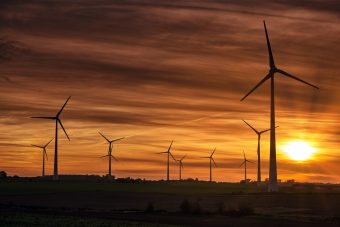
Wind energy brings jobs and value creation to deprived rural and coastal communities. Eastern Germany is a classic example of a region that has benefited. WindEurope saw this first hand on a recent visit to Rostock. And there are many more potential benefits for Eastern Germany. Worth bearing in mind as the region approaches big State elections in the coming weeks.
Rostock lies is in Mecklenburg-Western Pomerania (MWP) in North-East Germany. MWP is on the Baltic and shares a border with Poland. Since the reunification of Germany in 1990 MWP’s economy and living standards have struggled to catch up with Western Germany. Its once heavily agricultural economy is increasingly shifting to services, tourism, high-tech and renewable energies. But unemployment remains the third highest and income per capita one of the lowest among the German States.
Frontrunner in renewables
Renewables offer unique economic opportunities for Rostock and MWP. With fewer than 2 million people MWP has the lowest population density of German States. This offers space for wind and solar generation. Rostock has a long history as maritime hub once part of Hanseatic League. Now offshore wind is offering new opportunities for growth.
MWP is already a frontrunner in renewables – wind is 60 per cent of the electricity it produces. It has 3.7 GW of onshore wind farms and 1.5 GW of offshore wind in the Baltic. Already today MWP is producing more electricity than it consumes, exporting the surplus to other German states. By 2025 MWP wants to have 6 GW of onshore and 1.8 GW of offshore wind.
Germany’s Federal Government has mandated MWP to set aside 2.1 per cent of its territory for onshore wind, up from 0.8 per cent today, and to identify the sites by 2032. Project developers are interested in building new wind farms there. But MWP needs to improve its permitting processes to meet the 2-year deadline in the EU Renewables Directive. No German State takes longer than MWP to permit new wind farms – it currently has around 1,000 wind turbines stuck in permitting.
More:
- EU Member States Must Take Urgent Action on NECPs and Overriding Public Interest
- New UK Government plans big push on wind
- Immediate Actions Needed to Unblock Grid Capacity for More Wind Energy
New wind energy investments will create hundreds of jobs
Rostock is a prime example of a just transition with renewables. The maritime industry in Rostock had been laid idle. But wind energy has breathed new life into the economic development of the city and wider region. And the footprint of Europe’s wind energy supply chain in Rostock is going to grow further.
Neptun Smulders, a joint venture between Belgian company Smulders and the local Neptun Werft shipyards (Meyer Group), are developing a manufacturing site for converter platforms for offshore substations in the Port of Rostock. They are securing the last permits and aim to start production in 2027. They will then manufacture 2 GW high voltage direct current converter platforms in Rostock every year.
And it’s not the only recent investment decision taken in Rostock. Transmission System Operator 50Hertz recently announced that they will build up a control and coordination centre for their offshore wind activities in the Baltic Sea. They’re acquiring a 23,000 square metre site in the Port of Rostock to host their incident and crisis management team and to be a storage location for offshore wind cables and other equipment needed to do repair work at sea. 50Hertz expect the centre to start operating in 2028.
The newcomers will join a busy wind energy supply chain in and around Rostock. This includes leading wind turbine manufacturer Nordex who manufacture nacelles and hubs in Rostock, specialised wind turbine manufacturer and project developer eno energy who can make up to 200 MW of wind turbines a year in their Rostock factory and wind turbine manufacturer Suzlon. Rostock also hosts Liebherr (maritime crane manufacturing), EEW Group (offshore foundations) and Eikboom GmbH (composites, nacelle cladding).
Upcoming elections could pose a challenge to industrial transformation
But Rostock’s green economic transformation could be impaired. This is if the far-right, which is currently polling at 25 per cent, gains further support in the State elections in MWP in 2026. The far-right question human-made climate change and want to end existing support mechanisms for renewables. They reject the further expansion of wind energy and want to reverse the transition to renewable electricity.
MWP is not the only Eastern German State at risk of this shift. In September Saxony, Thuringia and Brandenburg elect new State Governments. In all three States the far-right is currently leading the polls. The example of Rostock shows that renewables should not be considered a threat but a huge opportunity for economic and regional development.
Source: Wind Europe

